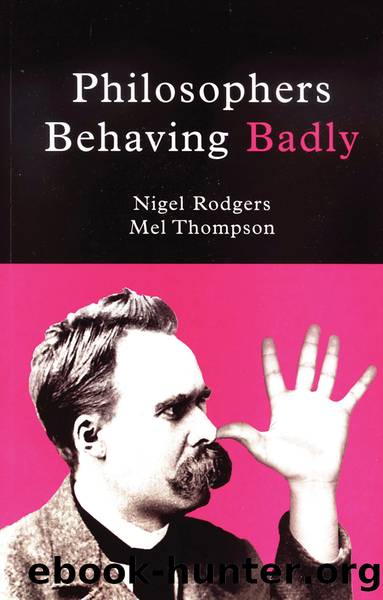Philosophers Behaving Badly by Rodgers Nigel; Thompson Mel; & Mel Thompson

Author:Rodgers, Nigel; Thompson, Mel; & Mel Thompson
Language: eng
Format: epub
Publisher: Peter Owen Publishers
Published: 2005-11-15T00:00:00+00:00
5
LUDWIG WITTGENSTEIN (1889â1951):
ANGER AND ASCETICISM
âGod has arrived: he came by the 5.15 train.â
â J.M. Keynes, 1929
âDonât think, but look.â
This advice, given by Ludwig Wittgenstein in his Philosophical Investigations, was intended to apply to the use of words, but it might equally be applied to understanding his own life and impact. Thinking about Wittgenstein is almost like thinking about God: the temptation to prostrate ourselves before such a towering intellect can be overwhelming. Looking at the man himself can be more rewarding.
Indisputably, Ludwig Wittgenstein was a seminal figure in modern philosophy, probably the twentieth centuryâs greatest and most radical thinker, but he was also one to be approached with extreme caution. Every great philosopher reputedly gives philosophy a new direction: Wittgenstein, astonishingly, managed to do so twice and towards the end of his comparatively short life was seemingly about to do so yet again. Tractatus Logico-Philosophicus, his slim, aphoristic book of philosophy published in 1922, was immensely influential on the Vienna Circle of philosophers and the movement that became known as Logical Positivism, although Wittgenstein had little patience with his philosophical followers. Assuming that his book had solved all the problems of philosophy, he went off to do other things, at various times being a schoolteacher, gardener and architect.
His genius in philosophy was recognized immediately he turned to it, however. In 1911, after an acquaintance of only a few weeks, Bertrand Russell â first his delighted tutor at Cambridge, then his awe-struck colleague and finally his bitter enemy â called him âperhaps the most perfect example I have ever known of genius as traditionally conceived, passionate, profound, intense and dominatingâ. Maynard Keynes, the great economist and no intellectual slouch himself, later put it more pithily. âGod has arrived: he came by the 5.15 train.â Wittgensteinâs posthumous fame has continued to grow until it has become a synonym for charismatic, uncompromising genius even among people who know nothing of his ideas. Books continue to appear about him in ever-growing numbers â there was even Derek Jarmanâs extraordinary, purportedly biographical film. The impact of his second philosophy, in Philosophical Investigations, was felt only after his death while that of his third, lesser known, phase is still affecting the intellectual world.
Wittgensteinâs charisma stemmed from his conviction that he was absolutely right â and any who disagreed with him absolutely wrong and intellectually or spiritually feeble. Much of his appeal lies, of course, in the limpid persuasiveness of his thought. The famous opening statement of his first and most famous work, the Tractatus, âThe world is all that is the caseâ, set the agenda for a careful and systematic definition of the function of language, and when he had finished defining what could be said closed with âWhereof we cannot speak, thereof we must remain silentâ, so preventing others from having their say or going beyond his discourse. In part, it was the product of a mathematicianâs mind that could analyse with impeccable logic. Yet it left open the possibility that language cannot start to
Download
This site does not store any files on its server. We only index and link to content provided by other sites. Please contact the content providers to delete copyright contents if any and email us, we'll remove relevant links or contents immediately.
The Light of Days by Judy Batalion(1110)
The Crime Book by DK(903)
Chasing the Thrill by Daniel Barbarisi(829)
1312, Among the Ultras by James Montague(804)
Invention by James Dyson(791)
The Complete Correspondence 1928-1940 by Theodor W. Adorno & Walter Benjamin(789)
E.R. Nurses by James Patterson(754)
The Doctor Who Fooled the World by Brian Deer(752)
Till Murder Do Us Part by James Patterson(724)
If You Should Fail by Joe Moran(703)
Mind Games by Neville Southall(690)
The Reporter by Mark Paul Smith(685)
Climb by Susan Spann(680)
Surely you Ìre joking, Mr Feynman by Richard Feynman(668)
Space 2069 by David Whitehouse(663)
Maradona: The Boy. The Rebel. The God. by Guillem Balagué(655)
The Dream Architects by David Polfeldt(638)
Banking and Beyond by Unknown(594)
Masterful Marks: Cartoonists Who Changed the World by Monte Beauchamp(587)
